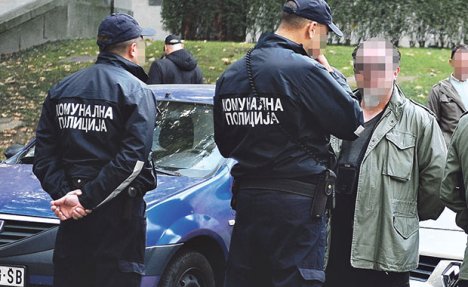My friend @bobrock wrote an interesting post regarding the harassment and abuse of force by municipal police in Serbia. For the proper introduction into this problem we are facing in Serbia, check out his post:
https://steemit.com/life/@bobrock/shocking-brutality-of-serbian-municipal-police-photo-video-18
Only a few months after starting their work, municipal police began to build the image that is today recognizable by: punching people in the public transportation, because they don’t have a ticket, preventing journalists from doing their job and civil activists without any legal basis, or arresting women and pinning them down on the floor because they sell on the street.

This bullish behavior of the Municipal Police is rather unusual. The regular police isn't that repressive as they are, and I think it's safe to say we all agree that selling watermelons without a proper permit is less of a crime than selling drugs to children in front of schools. It's not that the law should be less applied, its the way they are approaching arrests. Punching people in the gut for not having a ticket in the public transportation, pinning people to the ground and handcuffing them, for not paying their spot on the farmers market, resulted in the death from a heart attack from a harassed senior citizen also selling watermelons on the streets without a permit. So the question imposes - why are they using excess force on such benign offenses.
It all ties up with my previous post "The Cause Of Rising Military-Industrial Complex and Fear Based Propaganda" and the point I made regarding Urban Control. If you haven't read it for further reference:
https://steemit.com/politics/@drumsta/the-cause-of-rising-military-industrial-complex-and-fear-based-propaganda
Changes in global demography led the elites to concentrate their presence and power in cities.
The history of urbanization in the last three and a half decades will show us that the change in the role of police forces is one of the key mechanisms of parallel processes of reconstituting and restoring what I will call regulated (centrally planned) capitalism. The key to understanding is a policy proposal called "Broken Window" from 1982. This manifestation of conservatism claims that the primary task of the police forces (the forces in the hands of the state) - is not, as it is customary to say, "punishing criminals" and their "capture" on the contrary, the treatment of the smallest forms of "riot": drinking beer on the street, gathering young people, public urination, spitting, throwing out fumes, gathering in parks, smuggling in public transport, crossing the street from a pedestrian crossing, small sales from cardboard boxes; in short, a bunch of banal "offenses" (and less than offenses).
The theoretical background behind the proposal is like a parallel established with a building where one of the windows are broken. If the window stays broken, one might think that it's ok and all others can be broken as well, and in the end, all the windows will end up broken. The conclusion is that all windows are defended by fixing the one who was first crashed, and the doer punished and made an example from.
However, as it was never a matter of "windows outside their place", but only exclusively about "people outside their place," this policy paper can also be read as a requirement for systematic cleaning of urban environments from unwanted and ugly individuals, occurrences and behavior. It is therefore not surprising that this proposal can be read as an ideological basis for the criminalization of marginal groups and others "out of place", nor that "cleansing" has turned into inciting violence against marginalized people. But the authors themselves say that it's not about inventing the "new" strategy, but a request for returning the "old", "traditional" and "real" roles of the police: not the fight against "illegal" ranks, acts and behavior, but fighting disorder.

Thanks for this sociological analysis, I hope that now everyone understand what is happening in Serbia. Our duty is to speak about this, because this is the first step of our fight against municipal police.
exactly and thank you for pointing out such a problem
civil war